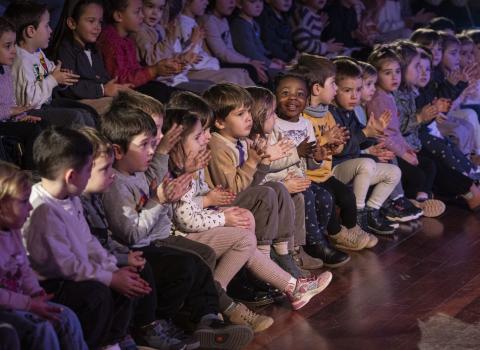Our history
The Basque National Orchestra, the leading symphony orchestra from an autonomous region nationwide, was created in 1982 on the basis of a project assigned to Imanol Olaizola, at that time music director with the Basque Government Department of Culture. Since Enrique Jordá took up the baton of a newly born formation as its artistic advisor and directed its first steps, different conductors have played their part in nurturing the quality and reach of the Basque Orchestra. Robert Treviño, Jun Märkl, Andrey Boreyko (as principal guest conductor), Andrés Orozco-Estrada, Gilbert Varga and Cristian Mandeal, Mario Venzago, Hans Graf, Miguel Ángel Gómez Martínez, Matthias Kuntzsch, Maximiano Valdés and Jordá himself, its honorary conductor, have governed the fate of the Orchestra in its rising trajectory.
The Orchestra live
A well-structured, dynamic activity with its roots in Basque cultural life has prompted the Basque National Orchestra to give more than 100 concerts every season, distributed into different cycles and in collaboration with different national and international institutions.
As part of its Season Concerts, the backbone of its activity, the Orchestra permanently performs four concert seasons at the Euskalduna Concert Hall in Bilbao, the Kursaal Auditorium in San Sebastián, the Principal Theatre in Vitoria and the Baluarte Auditorium in Pamplona. In each of these, it has shared the stage with conductors including Yehudi Menuhin, Krysztof Penderecki, Christopher Hogwood, Yakov Kreizberg, Jerzy Semkov, Lawrence Foster, Giovanni Antonini, Jesús López Cobos, Gerd Albrecht, Joana Carneiro and José Ramón Encinar. The list of soloists who have accompanied the Orchestra also features names such as Maria Joao Pires, Frank Peter Zimmermann, Mischa Maisky, Antonio Meneses, Christian Zacharias, Leonidas Kavakos, Radu Lupu, Arcadi Volodos, Heinrich Schiff, Vadim Repin, Hélène Grimaud, Branford Marsalis, Michel Camilo, Martin Fröst, Elisabeth Leonskaja, Alban Gerhard, Pinchas Zukerman, Joaquín Achúcarro, María Bayo, Carlos Alvarez, Mena, Ainhoa Arteta, Marta Zabaleta, Asier Polo and a long list of others. On the other hand, in the context of strong choral tradition, the Orchestra enjoys a close relationship with institutions such as the Orfeón Donostiarra, the Bilbao Choral Society, the Orfeón Pamplonés, the Coral Andra Mari Abesbatza and the Coro Easo. Also worthy of note is its collaboration with artistic institutions like the Malandain Ballet Biarritz: from the pit, the Orchestra has provided the music for its performances of Magnifique, Cendrillon and La Belle et la Bête.
Other seasons round off the concerts given by the Orchestra: the Miramón Matinées”, a season of small format but fine quality dedicated to chamber music or those given for an audience of children and families (“Family Concerts”) or schools (“Concerts for Schoolchildren”), which are complemented with other activities developed through the “Music Room”.
As an orchestra of its country, the formation regularly participates in the Bilbao Association of Friends of the Opera (ABAO) and in the Musika-Música festival in Bilbao, in the Classical Music Fortnight and the San Sebastian Film Festival, in the Festival Musique en Côte Basque, Musikaste, etc., and in different towns throughout our geography (“Orkestra Herrietan”)
…as well as farther away from home. For this orchestra, conveyor of our land’s cultural heritage, international tours acquire enormous importance. Austria, Argentina, Germany, Brazil, Chile, Switzerland, France, UK and Italy are some of the destinations of these tours which culminated in extensive acclaim, such as those given in famous halls like the Konzerthaus in Vienna, Teatro Colón in Buenos Aires, Prinzregententheater in Munich, the Kontzerthaus in Berlin, Tonhalle in Düsseldorf, La Sala in Sao Paulo, the Milan Auditorium, the Opéra Royal at the Château de Versailles or the Biennale di Venezia. Based on a policy of exchange with other orchestras on the state or international panorama, the Orchestra takes its music to other latitudes and brings foreign orchestras to our auditoriums.
A constantly growing sound archive.
The Basque Orchestra also has an important sound archive, fruit of an intense discographic policy essentially focussed on the symphony production of Basque composers. Outstanding is the Basque Music Collection published by CLAVES with the backing of the Mondragon Group, the most important compilation of works by Basque authors made to date. But its vocation to lend permanence to the masterpieces of Basque music extends beyond this collection, as we can see from the first recording of the opera Gernika by Francisco Escudero (Decca), one of the monuments of 20th century Basque musical creation, and the recording of La Llama, the opera by José María Usandizaga, in concert version (Deutsche Grammophon). As well as keeping the musical heritage alive, the Orchestra promotes its expansion by regularly commissioning works from Basque creators, whether emerging or acclaimed. One example of this interest is the composition project Tesela, developed to commemorate its 30th anniversary. Tesela encompassed the works commissioned from eight international composers in which they express their vision of the Basque Country; these works were performed for the first time in a concert and were put together as an album, with the exclusive collaboration of the BBVA Foundation.
A living orchestra
The Basque National Orchestra is a living and versatile body which makes experimenting with other cultural territories a rising value. Benito Lertxundi, Kepa Junkera, Ken Zazpi, Kirmen Uribe, Harkaitz Cano, Mike Oldfield and Jorge Drexler are the names of some of the artists who have accompanied us in this aspect of our activity. In 2001 our telematic concert was a pioneer online event; more than fifteen years later, the Internet is the auditorium in which we have exclusively presented our collaboration with Dr. Deseo and Zea Mays, before an audience of more than 420,000 people, a number which continues to rise. Film soundtracks too are an enormously attractive medium for bringing symphony music to the general public, and to an even greater extent if it is through the biggest box-office hits of recent years: Ocho apellidos vascos (Spanish Affair), A Monster Calls (Goya 2017), The Impossible, El mal ajeno (For the Good of Others), Submergence, etc. together with Fernando Velázquez and directors like Wim Wenders or J.A. Bayona.
The Orchestra’s organisational structure is headed by its Board of Directors, chaired by the Minister for Culture and President of the Orchestra. The Board is also made up of the Basque Government Deputy Minister for Culture and Director for Culture, as well as the deputies for culture of the three Basque provinces and representatives of different institutions. On the other hand, an Artistic Committee collaborates in defining and developing the Orchestra’s musical trajectory.
Primo Tempo (Kutxa, 2007). Book giving a rundown of the first 25 years in the history of the Basque National Orchestra. This volume is a collective testimony built on the basis of countless personal stories told by people who lived the Orchestra first hand at the beginning of its musical adventure.
The Orchestra is a member of:
- Spanish Association of Symphony Orchestras (AEOS)
- Network of Educational Concert Organisers (ROCE)
- Royal Basque Society of Friends of the Country (collective member)
- City of San Sebastian Gold Medal (2013)
You might be interested in...
Concerts & Tickets February













